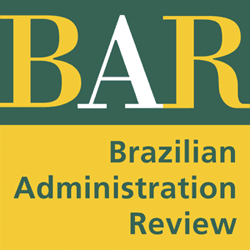EDITORIAL
Dear BAR Readers,
As BAR paves its way to ever more excellence in publishing, I would like to announce that BAR now demands that authors present, at the moment of submission, the necessary permissions to use any material protected by copyright law - for example, illustrations, artwork and photographs, including material originating from online or intranet sources. In order to reproduce such extracts, it is the author's responsibility to obtain written permission from the owners of the publishing rights.
It is now my pleasure to bring to your attention six interesting research articles.
The first paper ("Parallel Careers and their Consequences for Companies in Brazil"; by Maria Candida Azevedo) discusses the challenges of managing parallel careers and retaining people in organizations. Drawing from in-depth interviews with executives, who are themselves holders of parallel careers, this study concludes that firms concerned with having the best talent on their teams can benefit from a deeper understanding of parallel careers, which can be used to attract, develop, and retain talent.
The second contribution ("Life, Work and Sustainable Learning Practices: A Study on a Small Business Network"; by Ana Silvia Ipiranga and Marisia Aguiar) investigates potential multiple meanings of knowledge and knowing processes as work and life practices. Based in discursive practices analysis, this study suggests that organizations are social worlds forming a standard that holds life, work and organizational practices together. They negotiate, circulate, transform and reproduce, building a network of actors and favoring learning of sustainable practices.
The third article ("Ability-Based View in Action: A Software Corporation Study"; by Farley Nobre, David Walker and Michael Brown) uses the interplay of theoretical and empirical perspectives and takes a single-case research approach to investigate the antecedents of organizational capabilities, the consequences of dynamic capabilities in an organization and the measurement of their organizational consequences.
The next piece ("The Determinants of Credit Rating: Brazilian Evidence"; by Flávia Murcia, Fernando Murcia, Suliani Rover and José Alonso Borba) addresses the determinant factors of credit rating in Brazil - arguably a distinct financial context in comparison to advanced economies where most such studies have been conducted. Findings indicate that several factors can affect credit rating: leverage, internationalization, financial market performance, profitability and growth.
The fifth article ("Meanings of Consumption and Abandonment: Understanding Smoking Cessation Symbolism"; by Maribel Suarez) takes a less-traveled road in consumer marketing: the study of abandonment decisions. Based in one specific consumer goods category - cigarettes - this study reveals that abandonment may be laden with several meanings: connection, gift, or sacrifice. The article also discusses possible paths of intervention by firms.
The final piece in this issue ("Narratives and Sensemaking of an Organizationally-Based Environmental Disaster"; by Paulo Guimarães and Mario Aquino Alves) investigates the narratives of corporations, public agencies, politicians, unions, lawyers, public attorneys and the community related to an organizationally-based environmental disaster. By integrating sensemaking, narrative analysis and a theater metaphor, this study finds that narratives carry contradictions and reveals ways by which meanings are selected, legitimized, codified and institutionalized.
I hope that you will enjoy reading them!
Jorge Carneiro
Editor-in-Chief
Publication Dates
-
Publication in this collection
11 Apr 2014 -
Date of issue
June 2014

